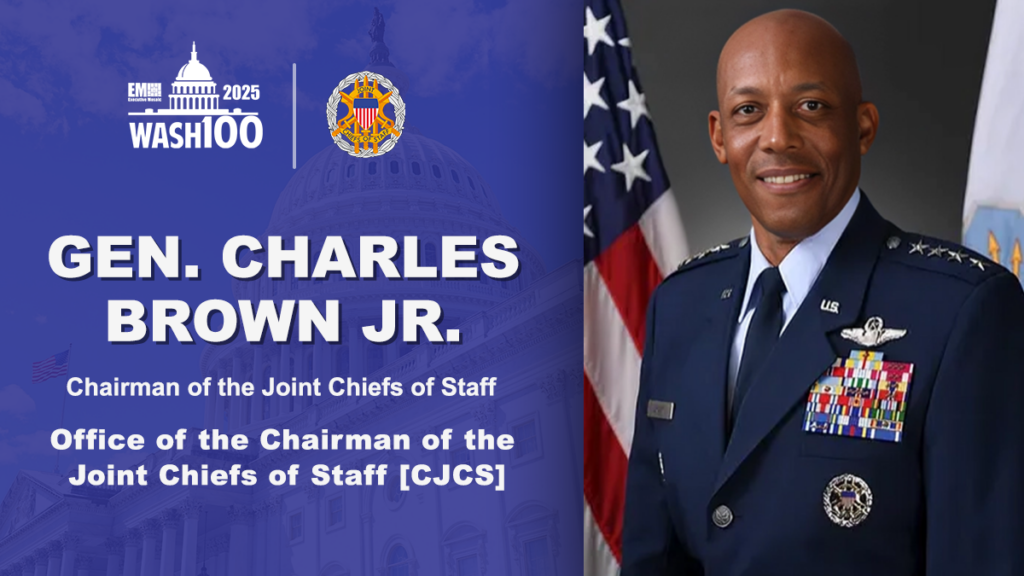Exceptional Leadership, Strategic Vision for US Military Land Gen. Charles Brown Jr. 2nd Wash100 Win

Executive Mosaic is pleased to announce the selection of U.S. Air Force Gen. Charles Brown Jr., the 21st chairman of the Joint Chiefs of Staff, to the Wash100 Award class of 2025. The Wash100 awards are given out annually in recognition of the most influential and impactful members of the government and government contracting industry. Brown’s win this year is his second straight.
Exceptional Leadership
Commenting on the award, Executive Mosaic CEO Jim Garrettson said, “Gen. Brown continues to demonstrate exceptional leadership as chairman of the Joint Chiefs of Staff, and it’s a pleasure to welcome him back to the Wash100 list. His steady hand and strategic vision have been crucial in shaping military readiness and ensuring the U.S. military stays prepared for an ever-evolving global landscape.”
“From overseeing key defense initiatives in AI and the space domain to fostering stronger collaboration between military branches, Gen. Brown’s leadership is helping to secure the nation’s defense posture. His ability to navigate complex challenges with a focus on long-term success underscores why he remains one of the most respected leaders in the national security space,” Garrettson, the founder of the Wash100 Award, added.
Select Gen. Charles Brown Jr. as your favorite 2025 Wash100 Award winner at Wash100.com! Voting closes on April 30, with the winner of the popular vote competition to be announced soon thereafter.
Strategic Perspective
Consistent in Brown’s approach to addressing the complex challenges he and the country face are the themes of interconnectedness and having a strategic perspective. During a Senate Armed Services Committee hearing in April 2024, Brown discussed the global security environment, saying that the challenges posed by Russia, China, Iran and North Korea, despite being geographically diverse, “are interconnected, which demands a strategic approach to addressing the immediate threats, while also preparing for future contingencies.”
In July, he elaborated on that strategic perspective using crises around the world as references. “We could look at things individually and [say], ‘Because this happened, we should go do X.’ But I’m looking at it from not only with X but what happens with Y and Z, too,” Brown said at the Aspen Security Forum.
“I have a responsibility to be thinking strategically about the actions we take, the recommendations I make, and what the risks [are] of broadening it [to] further escalation or broader conflict,” he added.
This way of thinking, of anticipating the potential secondary or tertiary effects of one’s actions, especially effects on allies and partners, naturally gives rise to a need for collaboration. It is in this spirit that Brown visited U.S. allies in the Indo-Pacific in July last year and allies in the Arctic region in October. The visits sought not only to communicate the strength of the relationship between the U.S. and its partners but also to bolster military interoperability and regional situational awareness.
Promoting Collaboration
For Brown, collaboration — not just at the international level, but also between government, industry and other stakeholders — is the pathway to success. Commenting on how collaboration can help address the challenge of ensuring materiel readiness amid contested logistics, Brown said during the Worldwide Logistics Symposium last year, “We must take an integrated approach. Efforts cannot be siloed; we need to communicate and work with each other and share effective solutions.”
Related to the issue of logistics is operational planning, which would also benefit from collaboration. The Joint Chiefs chairman said, “We must bring our allies and partners to the table and ensure the military services are converging as we prepare our operational plans to better balance our capability with our capacity and build consistent demands with the defense industrial base.”
Even the adoption of emerging technologies is impacted by collaboration. Brown said at the 2024 South American Defense Conference that in order to realize the benefits of artificial intelligence, seven challenges must be addressed, namely: infrastructure, architecture, data, focus, resourcing, talent and culture.
“These seven challenges … are challenges we all face. But by working together, we can share knowledge, experience and solutions [that enable] us to unlock the full potential of this new technology within our network of allies and partners,” Brown said.
An Unfair Fight
Ultimately, the leader of the Joint Chiefs strives not just to ensure the readiness of the U.S. military but to guarantee its superiority in a fight. During a visit in 2024 to Fort Eustis to commend members of the 7th Transportation Brigade (Expeditionary) for establishing an at-sea pier meant to help with the delivery of aid to Gaza, Brown said, “I have the opportunity to go all around the world and engage my counterparts, and I will tell you they want to be like us. Day-in and day-out, that’s the feedback I get. They want to know how the United States military, how we do what we do.”
“You’re the most respected, most combat-capable force in the world,” he added. “I’ll make sure we stay that way.”
Brown expressed these same sentiments in more pointed terms at the Aspen Security Forum. He said, “We exist to fight with our nation’s wars. We want to be so good at what we do, that our adversaries never want to mess with us. And if they do, we want to be their worst nightmare, personally, professionally,” adding, “I do not play for second place. I play to win, and I’m going to do everything I can to make sure it’s an unfair fight. That’s my focus.”
Congratulations to Gen. Charles Brown Jr. and his team for this accomplishment!
Don’t forget to vote for Gen. Charles Brown Jr. as your esteemed 2025 Wash100 awardee at Wash100.com!

